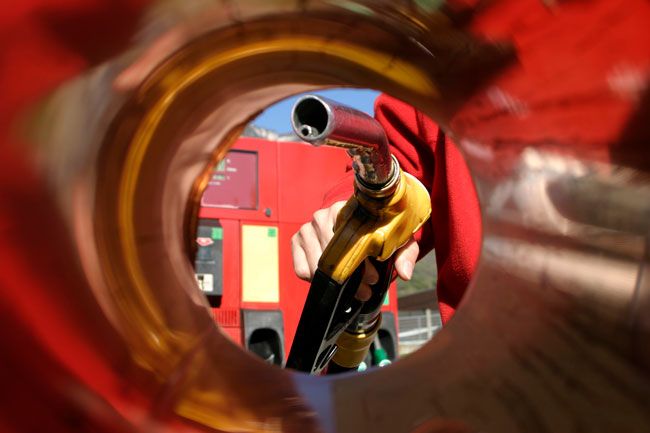
Optimizing fuel usage while controlling expenses is critical for operational success in fleet management. With fuel prices often fluctuating, fleet managers are increasingly turning to fuel cards to streamline operations and improve cost efficiency. Fuel cards simplify fuel purchasing and provide fleet managers with valuable insights and control over expenses, helping them make smarter decisions to maximize efficiency.
Unlike typical credit cards, fuel cards are innovative payment solutions that offer businesses a convenient way to control costs while ensuring transparency in fuel usage.
To better understand how fuel cards can impact fleet management, let’s explore what fuel cards are and how each feature can increase operational efficiency and reduce fuel spend.
Overview of Fuel Cards
Fuel cards, often called fleet cards, are created specifically for purchasing and managing fuel. Unlike typical credit cards, fuel cards are innovative payment solutions offering businesses a convenient way to control costs while ensuring transparency in fuel usage. They consolidate fuel and other vehicle-related expenses while simplifying and streamlining many facets of fleet management.
A fleet card is typically assigned to a driver. When fuel is purchased, the transaction details are recorded and the information is tied directly to the driver. There are several benefits fleet cards offer. We will look at the following in detail:
- Fuel rebates and discounts
- Real-time data
- Purchase controls
- Advanced security
- Reporting
Benefits of Implementing Fuel Cards
Fuel Rebates and Discounts
Fuel cards often offer fuel rebates and discounts on fleet-related expenses. CITGO fleet cards offer fuel rebates of up to 7¢ per gallon and exclusive discounts on auto parts, tires and hotels.
In addition to these savings, CITGO offers customer service support 24 hours each day, 7 days each week.
Real-time Data
Data drives so much of a healthy business, and fleet cards excel in data collection. Since every transaction is recorded in real-time, fleet managers always know who is spending what, where and when. Common data points include:
- Location of the transaction
- Price per gallon
- Total cost
- Mileage
- Fuel efficiency
- Driver ID
- Purchase date
- Purchase time
- Product purchased
This information gives managers an up-to-the-minute view of fuel consumption across the fleet, making it easier to identify inefficient routes or drivers who might be using more fuel than expected. Real-time data enables proactive decision-making, allowing fleet managers to monitor expenses effectively.
Expense Control with Purchase Limits

A core feature of fuel cards is the ability to set purchase limits. This gives fleet managers greater control over how much each driver can spend on fuel and other vehicle-related expenses. Purchase limits help prevent unauthorized spending and keep fleet fuel expenses aligned with budget goals and fuel policies.
These limits are fully customizable and can be tailored to specific drivers. This flexibility lets managers craft limits that align with fuel spending policies tailored to drivers’ schedules and needs. Some standard purchase limits include:
- Daily, weekly, or monthly purchase limits.
- Approved hours of the day or days of the week. This means a card can be made active only when a driver would typically be working.
- Restrictions on fuel type or fuel grade.
- Approve purchases for locations.
By restricting spending, fuel cards help reduce the likelihood of fraud, minimize the chance of unnecessary purchases and help drivers adhere to fuel spending guidelines and policies.
In an industry where every mile and every gallon counts, fuel cards are crucial in helping fleet managers control costs and improve operational efficiency.
Security
Fuel card providers prioritize security to protect fleet companies from theft and unauthorized spending. Compared to traditional credit cards, fuel cards have enhanced security measures to protect the company and its drivers.
- PIN authentication: Many fuel cards require a unique PIN for each driver, adding an additional layer of security.
- Transaction monitoring: Fuel cards often provide alerts for suspicious or high-value transactions, allowing fleet managers to take immediate action if a transaction appears unusual.
- Fuel card deactivation: Fleet managers can quickly deactivate the fuel card in case of loss or suspected theft to prevent misuse.
These security measures help minimize the risk of fraudulent purchases and ensure fuel-related expenses remain under strict control.
Detailed Expense Tracking and Reporting
Fuel cards provide fleet managers with comprehensive tracking capabilities, allowing them to analyze fuel expenses at a granular level. This tracking offers visibility into each transaction, showing where every dollar goes and empowering managers with data to improve efficiency.
Automated Fuel Expense Tracking
Fuel cards automatically track every fuel purchase, logging the date, time, location and amount spent. This automation reduces the need for manual data entry, saving time and minimizing human error. With fuel cards, there is no need to collect receipts or submit expense reports, resulting in a more efficient operation and less money spent.
Reporting and Analytics
Most fuel cards have built-in reporting and analytics features, enabling fleet managers to generate detailed reports on fuel usage, expenses and driver behavior. This information can help improve fleet efficiency and identify areas for cost savings.
Customizable Reports
Fuel cards often allow managers to create custom reports based on specific metrics, such as fuel consumption per vehicle, cost per mile and overall fleet fuel expenses.
Driver Performance Analysis
Managers can track individual driver fuel usage, helping them identify inefficient driving habits or routes that may cost the fleet money.
Trend Analysis
Fuel cards provide historical data, allowing fleet managers to analyze trends and make informed decisions to optimize future fuel purchases.
Through advanced reporting, fuel cards like those offered by CITGO provide insights that help managers reduce fuel expenses, enhance driver performance, and optimize routes for greater efficiency.
Fleet Efficiency is the Key to a Successful Business
In an industry where every mile and every gallon counts, fuel cards are crucial in helping fleet managers control costs and improve operational efficiency. As fuel costs continue to be a significant portion of fleet expenses, the advantages offered by fuel cards are hard to ignore. By adopting fuel cards, fleet managers can better control their budgets, enhance security and gain valuable insights that drive long-term savings and success.